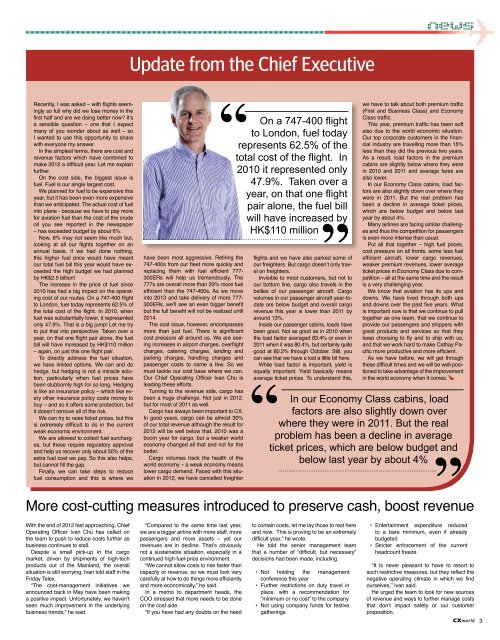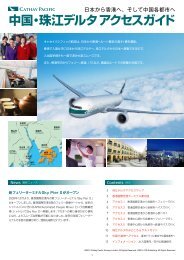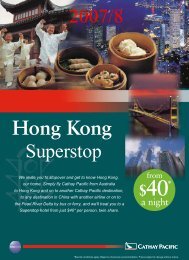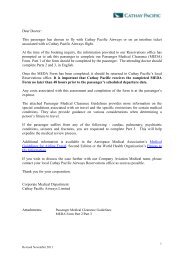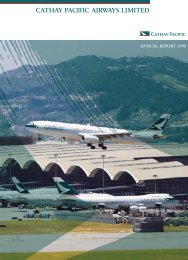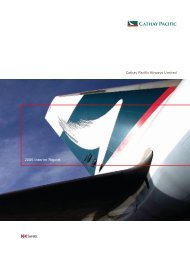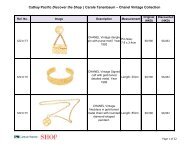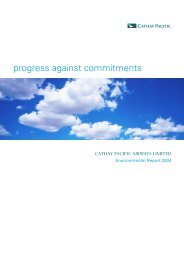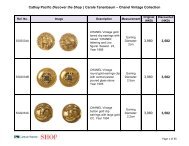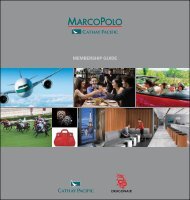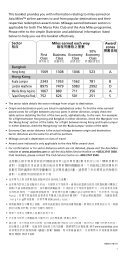stop press - Cathay Pacific
stop press - Cathay Pacific
stop press - Cathay Pacific
Create successful ePaper yourself
Turn your PDF publications into a flip-book with our unique Google optimized e-Paper software.
Recently, I was asked – with flights seemingly<br />
so full why did we lose money in the<br />
first half and are we doing better now? It’s<br />
a sensible question – one that I expect<br />
many of you wonder about as well – so<br />
I wanted to use this opportunity to share<br />
with everyone my answer.<br />
In the simplest terms, there are cost and<br />
revenue factors which have combined to<br />
make 2012 a difficult year. Let me explain<br />
further.<br />
On the cost side, the biggest issue is<br />
fuel. Fuel is our single largest cost.<br />
We planned for fuel to be expensive this<br />
year, but it has been even more expensive<br />
than we anticipated. The actual cost of fuel<br />
into plane - because we have to pay more<br />
for aviation fuel than the cost of the crude<br />
oil you see reported in the newspaper<br />
– has exceeded budget by about 6%.<br />
Now, 6% may not seem like much but,<br />
looking at all our flights together on an<br />
annual basis, if we had done nothing,<br />
this higher fuel price would have meant<br />
our total fuel bill this year would have exceeded<br />
the high budget we had planned<br />
by HK$2.5 billion!<br />
The increase in the price of fuel since<br />
2010 has had a big impact on the operating<br />
cost of our routes. On a 747-400 flight<br />
to London, fuel today represents 62.5% of<br />
the total cost of the flight. In 2010, when<br />
fuel was substantially lower, it represented<br />
only 47.9%. That is a big jump! Let me try<br />
to put that into perspective. Taken over a<br />
year, on that one flight pair alone, the fuel<br />
bill will have increased by HK$110 million<br />
– again, on just this one flight pair.<br />
To directly address the fuel situation,<br />
we have limited options. We can and do<br />
hedge, but hedging is not a miracle solution,<br />
particularly when fuel prices have<br />
been stubbornly high for so long. Hedging<br />
is like an insurance policy – which like every<br />
other insurance policy costs money to<br />
buy – and so it offers some protection, but<br />
it doesn’t remove all of the risk.<br />
We can try to raise ticket prices, but this<br />
is extremely difficult to do in the current<br />
weak economic environment.<br />
We are allowed to collect fuel surcharges,<br />
but these require regulatory approval<br />
and help us recover only about 50% of the<br />
extra fuel cost we pay. So this also helps,<br />
but cannot fill the gap.<br />
Finally, we can take steps to reduce<br />
fuel consumption and this is where we<br />
have been most aggressive. Retiring the<br />
747-400s from our fleet more quickly and<br />
replacing them with fuel efficient 777-<br />
300ERs will help us tremendously. The<br />
777s are overall more than 20% more fuel<br />
efficient than the 747-400s. As we move<br />
into 2013 and take delivery of more 777-<br />
300ERs, we’ll see an even bigger benefit<br />
but the full benefit will not be realized until<br />
2014.<br />
The cost issue, however, encompasses<br />
more than just fuel. There is significant<br />
cost <strong>press</strong>ure all around us. We are seeing<br />
increases in airport charges, overflight<br />
charges, catering charges, landing and<br />
parking charges, handling charges and<br />
passenger costs to name a few. So we<br />
must tackle our cost base where we can.<br />
Our Chief Operating Officer Ivan Chu is<br />
leading these efforts.<br />
Turning to the revenue side, cargo has<br />
been a huge challenge. Not just in 2012,<br />
but for most of 2011 as well.<br />
Cargo has always been important to CX.<br />
In good years, cargo can be almost 30%<br />
of our total revenue although the result for<br />
2012 will be well below that. 2010 was a<br />
boom year for cargo, but a weaker world<br />
economy changed all that and not for the<br />
better.<br />
Cargo volumes track the health of the<br />
world economy – a weak economy means<br />
lower cargo demand. Faced with this situation<br />
in 2012, we have cancelled freighter<br />
flights and we have also parked some of<br />
our freighters. But cargo doesn’t only travel<br />
on freighters.<br />
Invisible to most customers, but not to<br />
our bottom line, cargo also travels in the<br />
bellies of our passenger aircraft. Cargo<br />
volumes in our passenger aircraft year-todate<br />
are below budget and overall cargo<br />
revenue this year is lower than 2011 by<br />
around 13%.<br />
Inside our passenger cabins, loads have<br />
been good. Not as good as in 2010 when<br />
the load factor averaged 83.4% or even in<br />
2011 when it was 80.4%, but certainly quite<br />
good at 80.2% through October. Still, you<br />
can see that we have a lost a little bit here.<br />
While load factor is important, yield is<br />
equally important. Yield basically means<br />
average ticket prices. To understand this,<br />
we have to talk about both premium traffic<br />
(First and Business Class) and Economy<br />
Class traffic.<br />
This year, premium traffic has been soft<br />
also due to the world economic situation.<br />
Our top corporate customers in the financial<br />
industry are travelling more than 15%<br />
less than they did the previous two years.<br />
As a result, load factors in the premium<br />
cabins are slightly below where they were<br />
in 2010 and 2011 and average fares are<br />
also lower.<br />
In our Economy Class cabins, load factors<br />
are also slightly down over where they<br />
were in 2011. But the real problem has<br />
been a decline in average ticket prices,<br />
which are below budget and below last<br />
year by about 4%.<br />
Many airlines are facing similar challenges<br />
and thus the competition for passengers<br />
is even more intense than usual.<br />
Put all that together – high fuel prices,<br />
cost <strong>press</strong>ure on all fronts, some less fuel<br />
efficient aircraft, lower cargo revenues,<br />
weaker premium revenues, lower average<br />
ticket prices in Economy Class due to competition<br />
– all at the same time and the result<br />
is a very challenging year.<br />
We know that aviation has its ups and<br />
downs. We have lived through both ups<br />
and downs over the past five years. What<br />
is important now is that we continue to pull<br />
together as one team, that we continue to<br />
provide our passengers and shippers with<br />
great products and services so that they<br />
keep choosing to fly and to ship with us,<br />
and that we work hard to make <strong>Cathay</strong> <strong>Pacific</strong><br />
more productive and more efficient.<br />
As we have before, we will get through<br />
these difficult times and we will be well-positioned<br />
to take advantage of the improvement<br />
in the world economy when it comes.<br />
More cost-cutting measures introduced to preserve cash, boost revenue<br />
With the end of 2012 fast approaching, Chief<br />
Operating Officer Ivan Chu has called on<br />
the team to push to reduce costs further as<br />
business continues to stall.<br />
Despite a small pick-up in the cargo<br />
market, driven by shipments of high-tech<br />
products out of the Mainland, the overall<br />
situation is still worrying, Ivan told staff in the<br />
Friday Telex.<br />
“The cost-management initiatives we<br />
announced back in May have been making<br />
a positive impact. Unfortunately, we haven’t<br />
seen much improvement in the underlying<br />
business trends,” he said.<br />
“Compared to the same time last year,<br />
we are a bigger airline with more staff, more<br />
passengers and more assets – yet our<br />
revenues are in decline. That’s obviously<br />
not a sustainable situation, especially in a<br />
continued high-fuel-price environment.<br />
“We cannot allow costs to rise faster than<br />
capacity or revenue, so we must look very<br />
carefully at how to do things more efficiently<br />
and more economically,” he said.<br />
In a memo to department heads, the<br />
COO stressed that more needs to be done<br />
on the cost side.<br />
“If you have had any doubts on the need<br />
to contain costs, let me lay those to rest here<br />
and now. This is proving to be an extremely<br />
difficult year,” he wrote.<br />
He told the senior management team<br />
that a number of “difficult, but necessary”<br />
decisions had been made, including:<br />
•<br />
•<br />
•<br />
Not holding the management<br />
conference this year<br />
Further restrictions on duty travel in<br />
place, with a recommendation for<br />
“minimum or no cost” to the company<br />
Not using company funds for festive<br />
gatherings<br />
•<br />
•<br />
Entertainment expenditure reduced<br />
to a bare minimum, even if already<br />
budgeted<br />
Stricter enforcement of the current<br />
headcount freeze<br />
“It is never pleasant to have to resort to<br />
such restrictive measures, but they reflect the<br />
negative operating climate in which we find<br />
ourselves,” Ivan said.<br />
He urged the team to look for new sources<br />
of revenue and ways to further manage costs<br />
that don’t impact safety or our customer<br />
proposition.<br />
3


